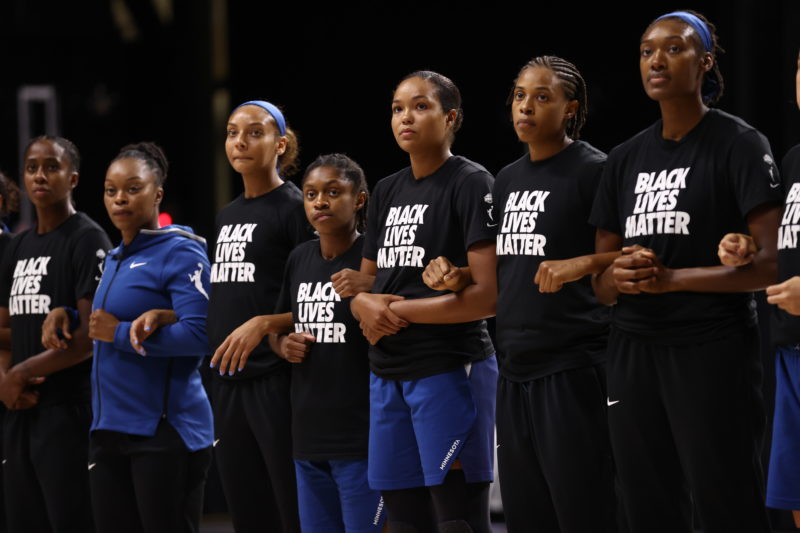The Players of the WNBA

For their bold courage and unity in the face of some of the most turbulent times in this country’s history, the Players of the WNBA have shown grace, poise and power in an unconventional 2020 season by dedicating themselves and their season to social justice and racial equality. For their strength, unity and bravery, the Players of the WNBA as a collective are this year’s Wilma Rudolph Courage Award recipient, to be awarded at the Women’s Sports Foundation annual Salute to Women in Sports livestream event on October 14. The Players of the WNBA are joining a long list of accomplished past honorees that includes Marta Vieira da Silva, Caster Semenya and Tatyana McFadden. The award will be presented during the live broadcast 2020 Annual Salute to Women in Sports on October 14 at 8 PM ET.
In early July, just a few weeks before the teams entered the ‘Wubble’ at IMG Academy in Bradenton, Fla., for their shortened season, the league and the Women’s National Basketball Players Association announced The WNBA Justice Movement and the creation of the WNBA/WNBPA Social Justice Council, setting the stage for a bold, first-of-its-kind commitment from the players to advocating for social justice.
In a league that is comprised of 80% Black women, players utilizing their voices and platforms is nothing new. WNBA players have historically been at the forefront of issues they are passionate about and have been unapologetically themselves as they continue to speak out about issues facing the LGTBQ+ community, racial and gender equality and mass incarceration, among other causes.
Though the season is dedicated to the Black Lives Matter and Say Her Name campaigns, the mission of the Social Justice Council — led by players like WSF Ambassador Layshia Clarendon, Breanna Stewart, A’ja Wilson, Satou Sabally, Tierra Ruffin-Pratt and Sydney Colson — is to be a driving force of necessary and continuing conversations about race, voting rights, LGBTQ+ advocacy and gun violence, as well as other societal issues.
The players have taken the initiative and put it into action. “Black Lives Matter” shirts are worn during warm-ups at every game — Clarendon’s New York Liberty have also worn “Black Trans Lives Matter” shirts — and players’ jerseys display Breonna Taylor’s name to “seek justice for women and girls who have been the forgotten victims of police brutality and racial violence.” Also, a moment of silence and remembrance is held before each game to honor Black women who have been killed as a result of the systemic, race-based violence that is the center of the Black Lives Matter movement.
In addition to the league-wide initiatives, teams and individual players have begun their own movements. The Indiana Fever players led the #Rebounds4Change campaign as a fundraiser for fans to donate to social justice causes for each rebound this season. The Atlanta Dream, Phoenix Mercury and Chicago Sky wore “Vote Warnock” shirts to support the Senate campaign of Raphael Warnock in Georgia, who is running against Dream owner Kelly Loeffler, an outspoken opponent of the Black Lives Matter movement. Maya Moore, Natasha Cloud, Renee Montgomery and others have taken the bold step of opting out of the season, in effect pausing their WNBA careers, to fight for social justice off the court. Further, several players, including Candace Parker, Devereaux Peters, Jonquel Jones, Wilson and Clarendon have penned pieces in The Players’ Tribune about their experiences as Black women in this country, and others such as Katie Lou Samuelson, Elena Delle Donne and Natalie Achonwa have publicly spoken out about their struggles with health, both mental and physical.
In 2020, the Players of the WNBA have set the bar for other professional sports leagues — men’s and women’s — looking to add their voices to the momentum around combatting police brutality and race-based oppression.
